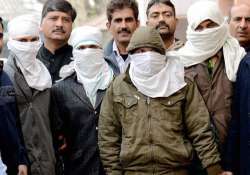IS-linked terror group was in touch with men close to Baghdadi
New Delhi: The recently busted pan-India terror module was in "constant touch" with people perceived to be close to Abu Bakr al-Baghdadi, the feared leader of the Islamic State, receiving instructions for carrying out explosions

New Delhi: The recently busted pan-India terror module was in "constant touch" with people perceived to be close to Abu Bakr al-Baghdadi, the feared leader of the Islamic State, receiving instructions for carrying out explosions at important places ahead of the Republic day.
The NIA and other central security agencies arrested 14 people on Friday and Saturday for allegedly planning to carry out attacks ahead of Republic Day.
Those arrested included Mudabbir Mushtaq Shaikh, the self-styled 'Ameer' of 'Janood-ul-Khalifa-e-Hind' (Army of Caliph of India), the Indian wing of ISIS.
He was the man behind raising the outfit after earlier attempts by the global terror organisation to set up its base in the sub-continent failed, official sources said.
Shaikh, who assumed the title of 'Ameer', supposedly under instructions from Baghdadi himself, was active on some of the social networking sites.
Manager, product development, for a sports company, he was under surveillance of intelligence agencies for several months and was tracked down after he received money routed out of Turkey and Syria.
The idea behind setting up the terror group in India was to extend Baghdadi's fearsome 'Caliphate', sources said, adding his custodial interrogation may help the security agencies unravel the plans of the organisation.
Within a short span the group established a complete chain of command with Shaikh being the Ameer, while Rizwan Ali, a resident of Kushi Nagar in Uttar Pradesh, was its Naib-Ameer (deputy Chief).
Mangalore resident Najmul Huda was appointed 'Ameer-e-Askari' (batallion commander) and Mohammed Nafees Khan of Bihar, who was arrested from Hyderabad, was the group's 'Ameer-e-Wyulat' (head of finance), sources said.
The NIA had registered a case in 2015 after "credible information" was received that the Islamic State of Iraq and Levant (ISIL), also known as Islamic State of Iraq and Syria (ISIS) or Dawlah-al Islamiyah fil-Iraq wa-sh Sham (DAISH), has been engaged in radicalising Indian youth and motivating them to join the terrorist organisation.